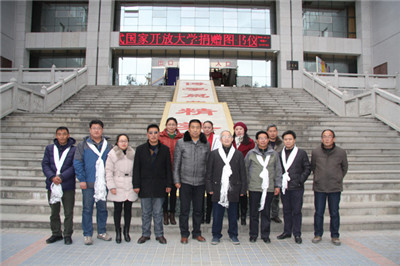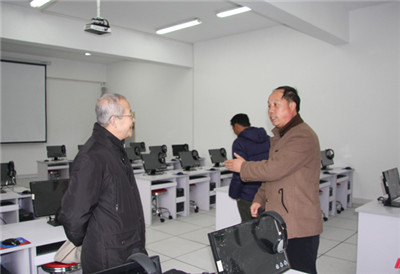 On 17 December 2014, a team led by Vice President Zhang Hui of The Open University of China (OUC) went to the School of Xizang to carry out training in the application of the digital library in the Linzhi Learning Centre of the school. Teachers and staff members from the School of Xizang and the Linzhi Learning Centre took part in the training, which was the first application and promotion activity in the school initiated by the OUC as part of its “Year of Digital Library Promotion” event.
On 17 December 2014, a team led by Vice President Zhang Hui of The Open University of China (OUC) went to the School of Xizang to carry out training in the application of the digital library in the Linzhi Learning Centre of the school. Teachers and staff members from the School of Xizang and the Linzhi Learning Centre took part in the training, which was the first application and promotion activity in the school initiated by the OUC as part of its “Year of Digital Library Promotion” event.
The training activity, also an important part of the work to bring digital libraries to the grass roots and realize full coverage in the whole nation, will provide effective support and assistance in document and information resources for the School of Xizang.
At the training meeting, Zhang Hui introduced the construction and service status of the OUC's digital library. He stressed that the OUC’s Digital Library had already reached the point of providing accesses to all of its teachers, staff members, and students at anytime, anywhere. As readers of the OUC’s Digital Library, teachers, staff members, and students from the School of Xizang were also able to enjoy priority access to the service. By making good use of it, the digital library can offer practical services for teachers and students and become a wonderful service by which the School of Xizang can better serve the needs of lifelong learning in Tibet.
Executive Vice President Ci Ren from the School of Xizang presided over the meeting and expressed appreciation for the rich resources brought to the teachers, staff members, and students through the digital library made available by the headquarters of the OUC. The vice curator of the library, Zhao Xuan, offered training on how to use the digital library, as well as the frequently used data.

Investigation and research in the newly constructed computer room of Linzhi Learning Centre
During their stay in Tibet, the team, led by Zhang Hui, conducted investigation and research into the newly constructed Linzhi Learning Centre (supported by the Agriculture and Animal Husbandry College of the University of Tibet). They also had extensive communication regarding the construction of the digital library as well as the construction and use of learning resources with the working staff in the local library. The training was widely welcomed by teachers and students from the School of Xizang. Through careful questions and suggestions for the digital library, the staff members reflected their hopes for the widespread use of the digital library and expectation that the digital library will provide more useful resource.

A group photo of Zhang Hui’s team and supervisors from the School of Xizang and Linzhi Learning Centre
By Zhao Xuan, the OUC